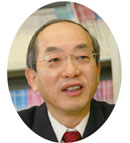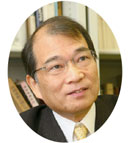
Activities to promote the commercialization of research resultsIn order to establish constituent technologies capable of achieving the next-generation sheet devices and turn them into marketable deliverables at an early date, the project attempts to strengthen collaboration among industry, academia and local government, and promote communication exchanges and cooperation between upstream companies, which develop or manufacture materials, and downstream companies, which manufacture devices and finished products. Also, as part of the effort to build a solid foundation for collaboration and expand the range of collaboration among industry, academia and local government in the region, the project also seeks to identify and cultivate future business incubators that can create and develop new businesses.
Conduct surveys of technology trends, market needs, patent-related information and others Perform marketing activities that will turn technologies into products Exhibit technologies, deliverables and products at trade shows or similar events and promote business matchmaking opportunities
Present joint research results and elucidate technology trends Exchange researchers between universities, research institutions and business organizations Hold study meetings at both the single and multisubject research level
Cultivate human resources that can formulate and implement new business development projects as a business incubator
|
|
 |
In order to successfully realize and commercialize the next-generation sheet devices using nanomaterials, it is very important to combine basic research carried out in the university with the technical expertise of industry, by the leverage of the potential of public research institutions that have contributed to the industries in the region over a long period. I am happy and excited to take on the role of Research Supervisor, in order to help build a solid foundation for collaboration among and between industry, academia, and local government. Through the collaborative works, advanced and innovative technologies for nanomaterials are expected to be available for a wide range of applications. Chief Scientist |
 |
As Science and Technology Coordinator for the project, I would like to work closely with researchers from all of the participating universities, research institutions and business organizations, so that their perspectives can be taken into account when providing them with necessary support, including the setting of goals, in an effort to facilitate the successful implementation of the project. Another important role of the coordinator is to make the project flexible and responsive to today’s rapidly changing technology and market environment by giving both timely and practical assistance to the research group, through acting as a conduit for the opinions and advice provided by the concerned departments and advisors. I also hope that the project will prove to be sustainable over time as a long-term visionary strategy as well. Science and Technology Coordinator |